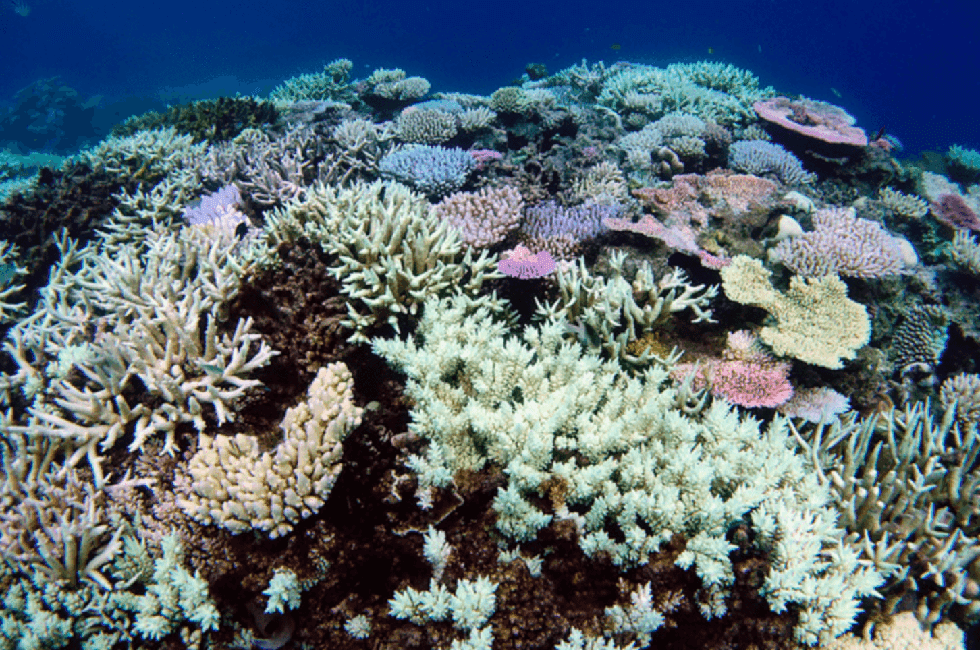I'm sure everyone has heard: The Great Barrier Reef was pronounced dead last week... And then scientists gave us some great, yet bittersweet news: the reef is not yet dead, but it's dying.
It turns out that Rowan Jacobsen, a travel blogger, wrote an article pronouncing The Great Barrier Reef dead. Essentially, Jacobsen wrote a false obituary for the reef, saying that the reef "passed away in 2016 after a long illness," and I could not scroll through any news station or social media account without seeing someone talking about the article. Not to mention that over a million people have shared it since it's release, and the article has received a huge emotional response from people all over the world.
However, scientists have spoken, and although The Great Barrier Reef is dying, the entity isn't quite dead yet. We have been assured that, like most other coral on this planet, the reef is under severe stress from rising water temperatures and human activities, but it has not succumbed to death yet.
Among the scientists speaking about this issue is Kim Cobb, a professor at Georgia Tech’s School of Earth and Atmospheric Sciences. She told us that yes, like Jacobsen mentioned, the reef just underwent a massive bleaching event; yet just because the coral is bleached, doesn't mean that it's dead. Cobb explained that coral is an animal, and has a symbiotic relationship with algae. The algae provides the coral with food, while the algae get a great home. Yet, when the ocean becomes too warm, the algae become destructive to the coral, giving off harmful chemicals. When the coral realizes this, it literally spits out the algae. This algal rejection is what removes all the color from the animal. So, when we see coral that has been bleached, we are seeing coral without its algae, but the coral isn't necessarily dead at that time. However, if the water temperature doesn't cool back down, the algae will not come back, and the coral will literally starve to death.
So, the Great Barrier Reef is not dead... yet.
Nonetheless, now that countless articles discussing the Great Barrier Reef and the falsehood of Jacobsen's obituary have come out, I don't see people as concerned as they were before. To put it bluntly, before we knew that the reef's death was false, everyone was appalled that the 25 million year old Great Barrier Reef had passed away, and the article caused a tremendous amount of people to grieve for the Earth.
Now that the reef is still hanging on though, I haven't seen as much enthusiasm and uproar, which boggles my mind. Essentially, we just found that one of the world's greatest entities, one of the 7 Natural Wonders of the World, is still alive and kicking, and we are ignoring it. We are overlooking how huge this news is, and frankly, the discovery that the Great Barrier Reef is still alive should have been a huge wake up call to the world.
We should have the same concern for the world and its well-being whether the Great Barrier Reef is alive or dead.
I'm puzzled at why, if people had such a negative response to the Great Barrier Reef dying because of warming waters and human activities, why are we not doing anything to save the parts of the reef that are left? According to scientists, the reef is not past the point of recovery, so why aren't we trying to keep it alive?
I for one think we should be trying to change our ways. Warming waters is the result of climate change, which is majorly caused by humans with the burning of fossil fuels, pollution, and a variety of other activities that we partake in. Likewise, overfishing and tourism has a huge affect on the Great Barrier Reef. Therefore, we should be trying to reduce our carbon footprints in every way that we can, because those footprints affect nearly every aspect of the environment. We can surely take small steps in our own lives to mitigate these aspects. For instance, we can try and live more sustainably by becoming more energy-efficient, recycling, avoiding pesticides, using water wisely, and being a smart seafood consumer... I just don't understand why we're not celebrating the reef's life and encouraging people to take actions in attempt to lessen our effect on it.
In the end, if you don't want to see the Great Barrier Reef actually pronounced dead, which many people don't, as seen in the responses to the original obituary, you need to do you part. No matter how small you think that part is, it will have some sort of positive impact down the line.
Please, do everything that you can so we won't have to read a real obituary for the Great Barrier Reef.




















